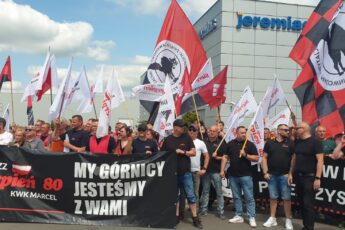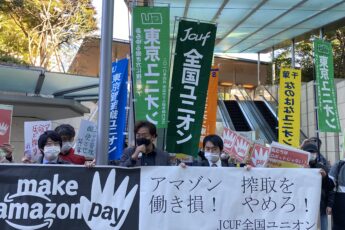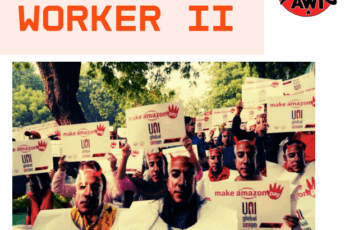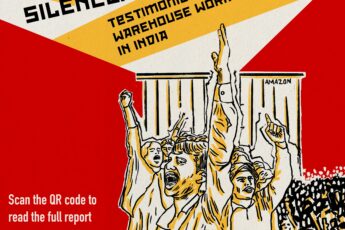
We publish an interview with Antek Wiesztort, Inicjatywa Pracownicza (Poland), international truck driver based in Poznan. In this interview, Antek reports about Uzbek and Georgian truck drivers’ strike that in the past weeks took place in Germany against their Polish employer. As this interview shows, companies take huge profits by the differentials of working conditions, wages, and regulations within the European market. Indeed, the Polish logistical sector – that is essential for the fulfillment of other Western European Union’s countries – highly relies on the employment of migrant workers, that are more subjected to exploitation because of their dependency to visas or residence permits. In this framework, as Antek says, the arrival of millions of Ukrainian refugees after the outbreak of the war strongly impacted the Polish market. While the government was not able to support the refugees, millions of Ukrainian women started working in different sectors. At the same time companies are pressing the government and the European Union to solve their problem of labor shortage by hiring, often illegally, migrants from Asia. This strike clearly shows the complexity of the scenario in which we have to fight together and that therefore transnational organization is more necessary than ever to connect the different conditions that are present within the European context. Despite all the difficulties they had to face, two days after this interview was taken, on April 26, the drivers striking in a truck parking in Gräfenhausen, Germany, finally won. According to the agreement, their boss paid 300 thousand euro they demanded, and declared to drop all the charges against them.
TSS: How did this strike start and how did it evolve? What are the last updates?
Antek: This is the fifth week of the strike. Last week two thirds of the workers got their wages, but the strike is going on until all of them will receive it. The companies by which the drivers are employed – Lukmaz, Agmaz, and Imperia – are Polish, based near Cracow, Kraków, and owned by one family of Mazur. They are subcontractors for biggest factories and warehouses including General Electric, Volkswagen, Ikea, and smaller ones that optimize their budget through social dumping. They got around one thousand trucks. This year German Mercedes decided to lease them 375 Actros trucks. Mazur is just a tool for all these international corporations.
Drivers go all around Europe doing cabotage and cross-trade in different countries, like Germany, Italy, France, Spain. Basically, during the last days of March, it had been 50 days that these drivers hadn’t received their money. Some of them also received only part of the pay for January as well. This is not exceptional. Delays and reductions in paying the salary are part of the organization of work of these companies. By March 20th, a dozen of drivers decided to stop in the parking of Vipiteno, near Brennero in Italy, and forty others in Gräfenhausen, in Germany. The boss sent a crew to negotiate with the ones in Vipiteno but they didn’t reach any conclusion. Italian police also suggested their strike is illegal. So, the part of the crew that was in Vipiteno joined the one in Germany to strike there. By that time, they were around 40 trucks and 60 drivers (most of them drive in double crews). They wrote an open letter to the boss to reach a compromise, but the boss didn’t want to negotiate. Instead, on April 7th (Easter Friday), the company hired a paramilitary group called Rutkowski patrol, to go to this truck parking in Germany and interrupt the strike. Rutowski is a quasi-detective celebrity and paramilitary in Poland. The first time he got engaged in breaking the strikes was already in 1981. When the martial law was introduced in the country during the Solidarity Movement, the founder, Rutowski, joined the paramilitary police and had a relevant role in strikebreaking, as he attempted to do in Gräfenhausen in 2023. April 7th, the boss went to the strikers with Rutowski’s crew and a bus filled with new drivers who should have substituted the ones on strike. The drivers that were sent to Germany did not know what was going on, they just thought they were going to switch the crew, which is quite usual. But the plan of the boss went very bad. The paramilitary group encountered the resistance of the drivers. There was a clash that was recorded by the media. Finally, German police intervened, arrested the paramilitaries, and obliged them to leave Germany. Furthermore, part of the drivers that were sent to break the strike decided to stay and join the strikers. So now there are around ninety drivers on strike. Rutowski and the management of the company decided to make a press conference in front of the German embassy in Warsaw to protest the persecution of the Polish entrepreneurs by German trade unions’ members, media, and police. So, we as IP (Inicjatywa Pracownicza – Workers’ Initiative) went there together with other people to block the conference. Meanwhile, the company hired a German lawyer to prosecute the drivers for embezzlement. The corporations are putting pressure to the boss because of the goods carried in the truck. In fact, the drivers are stopping not only the trucks but also the supplies that they were transporting. The boss is afraid of paying big fines for the supply. Now the situation is that the company boss has decided to pay most of the money, 200.000 euro, only to some, but workers want to keep striking until all of them receive their wages, circa 300.000 in sum.
As it happens in the essential sector and in the green jobs, where migrant workers are employed to fill the gaps and sustain society, also the striking truck drivers are mostly migrants from Eastern Europe. Where do they come from and how did this affect the working conditions and the treatment by the company? What role does the workers’ condition as migrants play in their organizing and demands?
It plays a huge role. The ones on strike are mainly from Georgia and Uzbekistan. This company however also hires workers from the Philippines and Nepal. The problem now is that since Monday most of the workers’ visas are expiring and they will have to go back to Poland. They have a working visa for a Polish company, it is a Polish visa that allows them to work outside the country as delegates of the company. The company charges circa 400 euro to fix all the documents, and the workers are dependent on the company for the documents to stay in the country. This exacerbates their condition of dependency and exploitation. For this reason, one case has been presented in Germany against Lukmaz – Agmaz accusing them of human trafficking, saying that they are not only bad employers but also human traffickers. Besides that, work time is different. For us Polish international truck drivers the most common work system is 2/1, 3/1, 4/1 meaning one week free. Alternatively, we are offered to go back home every weekend. Anyway, according to EU regulations, every weekend the boss should guarantee the drivers a way to stay outside of the truck, so it’s cheaper to send me home to reproduce my workforce. Migrants do not have a place to stay or a home, and then it is easier to have them working for several months in a row, without coming back to the base, staying in the truck. In Germany you can’t drive a truck on Sundays, so to compensate, bosses lower the salaries. The drivers employed by these companies have been working and living in the cabin in a double crew for the last three months. The company makes huge profits from this, and public institutions don’t care about it because to have drivers are all the time behind the wheel is in the interest of Western companies. Furthermore, all the migrant drivers hired by these companies are not hired through normal contracts but through a kind of “junk contract” that strips them of basic rights such as paid holiday and sick leave. The result is quite similar to what happens to Polish drivers, but it is pursued through different tools: Polish workers are hired with contracts but most of the salary is paid “under the table” and the official salary is the minimum wage. So basically, when we want to go on holiday or we are sick, our pay is based on the official minimum wage. So, these are different strategies for having the drivers always behind the wheels, which is a pillar for the functioning of international transportation in Europe.
This case clearly shows the way differences are exploited within the EU labor market. Each EU country applies different labor contracts, welfare provisions, laws on migration and strike regulations. While we are witnessing a wave of strikes in some EU countries like Germany and France, in Poland the strike is practically forbidden and violently obstructed, as you told us. How do these internal differentials within EU labor are put at value to exploit workers in the transport sector? How does the transnational dimension affect the strike and the mobilization?
We see a situation in which there are of course unequal conditions of work, unequal distribution of welfare and unequal regulations regarding the tools for fighting. The difference is evident with the regard to the right to strike, especially if we look at what is going on in France and Germany. In Poland, after the massive wave of strikes in the eighties and a systemic transition to market capitalism, new authorities imposed strong legal restrictions on organizing a strike. You need to go through rounds of negotiations, then organize a referendum with 50 percent turnout. Each of these phases is often obstructed by the bosses and Polish courts.
Concentrating on the transport branch of economy, the French and other Western drivers are relatively well organized. They got better conditions for organizing because they mostly work for a local market so it’s easier to build close contacts. On the contrary, truck drivers from the East are mostly international. In 2023, almost one third of international transport in EU is covered by trucks from Poland. More than 90 percent of parcels processed in Polish Amazon warehouses are sent and consumed outside of Poland. We function in Europe as a cheap labour force rather then consumers and this division of labour hasn’t changed since 500 years. As truck drivers, we are the veins and arteries of EU economy. Social dumping on salaries and all other rights is a method to keep us always behind the wheel.
Pressed by Western trade unions, the European parliament introduced a law called “mobility package”, designed for delegated workers so that they can earn the same wage of workers of the place where they work. Delegated workers from Poland are mainly working in construction and transport. If they work in Germany, they should be paid the German minimum wage, plus the extra cost to stay in the country, for example to spend the night there. But employers do not respect it. These drivers are asking very modest demands, they do not even demand what they should earn according to this EU regulation. Their demands are in line with the contract they had disregarding the implementation of this new regulations, plus the return of the money paid for insurance that was never covered by the boss. In such different conditions, it is clear that we don’t have the same rights. Anyway, we say that there are no legal or illegal strikes, there are only strikes that are won or lost. Here you get criminalized for a strike, but you keep mobilizing anyway. Also, we try to understand where it is easier not to be repressed by police, paramilitary groups, etc. The drivers consciously chose to set a strike in Germany and not in Poland because of this unequal distribution of rights.
Georgian and Uzbek drivers also managed to overcome the biggest constraint in international transport, namely that they are all the time scattered all around Europe. Earlier you had only a short distance CB Radio. Now we can use new means of group communication that allow us to keep in touch and to organize while we are in different places. After five weeks of strike, other drivers in Poland are more and more interested, we keep them updated. The boss admitted in a TV interview that he is under strong pressure from other bosses in the region to end the strike, because it’s provoking their drivers to get militant.
Even if Ukrainians are not involved in this specific strike, they are a crucial part of the workforce in Poland, both as workers in logistics and as truck drivers. How was the Polish labor market impacted by the beginning of the war in Ukraine?
Last February, in the beginning of the war, we witnessed a double movement. I could see it as a truck driver. Many male workers went back to Ukraine and at the same time there was of course the huge migration of women and children to Poland. Due to this, the composition of the workforce changed, also in the transport sector where suddenly there was a relevant lack of workforce. This process was even acknowledged by the government, which introduced compensation for the loss of workforce to the companies who had been hiring Ukrainian men. Many companies received this compensation, we speak of hundreds of millions of złoty. The bosses in the transport sector had problems because of lack of workforce, then they started to press the government and the EU parliament to make it easier to formally hire people from farther East: Philippines, Nepal, and India. But the companies that do it, and they are growing in numbers, are still “avant garde” because there are problem of qualifications, etc. It is not easy to do it illegally, but they are finding ways to do it.
Also, the arrival of millions of women changed the composition of the workforce. Besides the many women that are working in the care sectors, many started to work in the warehouses. Companies also started to hire Ukrainian women as drivers. Before the war you could hardly see any Ukrainian woman driving a truck internationally.
Is the government still giving support to Ukrainian refugees?
Not really. In the beginning, because of the decades of privatization of the public infrastructure, the government did not have the means to support refugees, and there was a historical moment in February, March and April when hundreds of thousands of people, especially in big cities, took refugees in their own apartments. This was a mass movement. The only thing the government could do was to give compensation to the people that were hosting these women and children in their houses, this was the basic tool for supporting refugees in the housing crisis.





